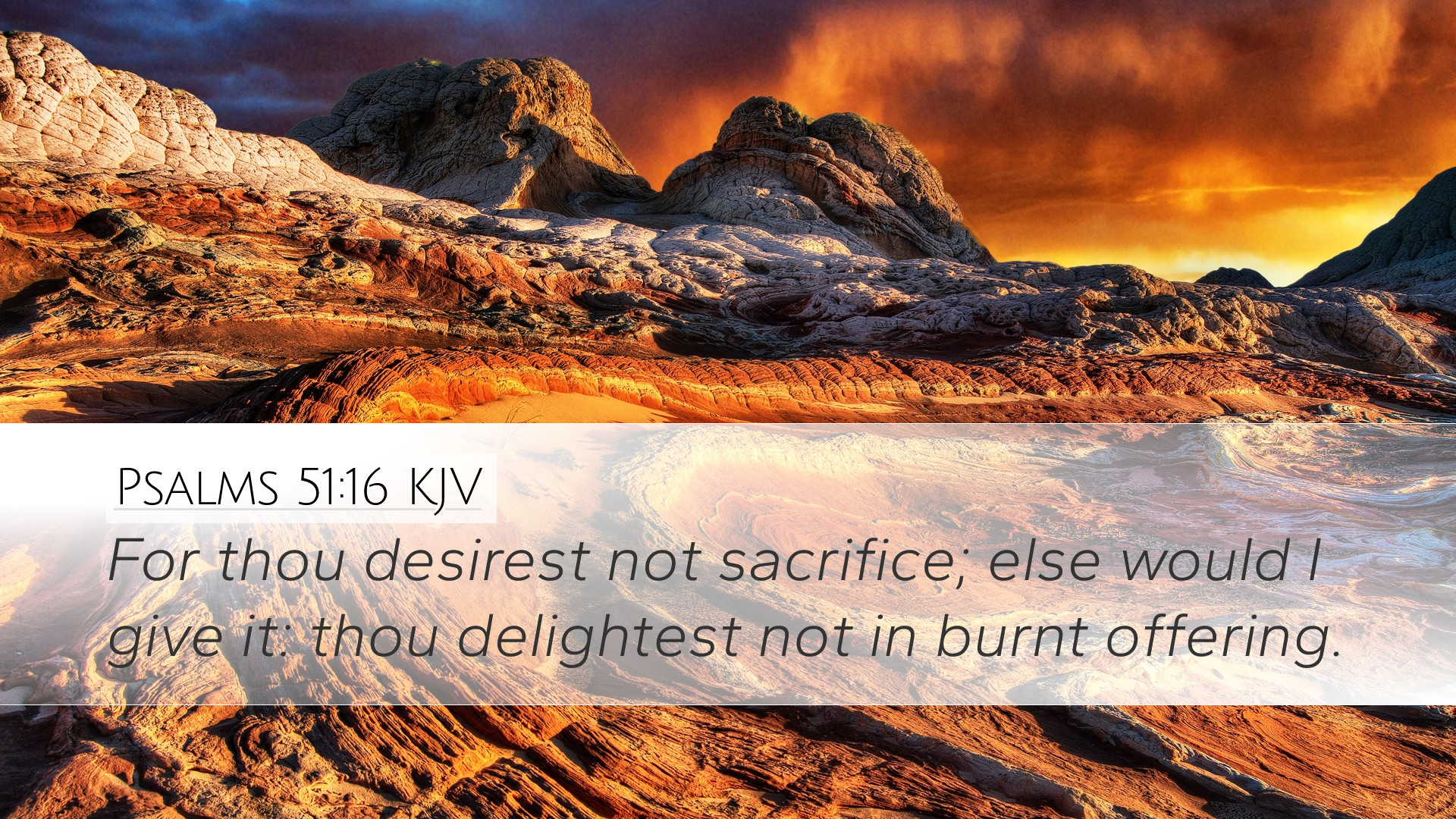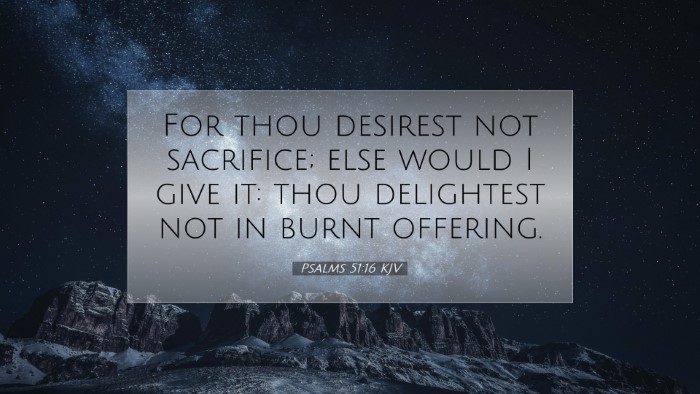Psalms 51:16 Commentary
Verse: "For You do not desire sacrifice, or else I would give it; You do not delight in burnt offerings."
Introduction
This verse from Psalms 51 offers profound insights into the nature of true worship and God's requirements for repentance. It reflects the deeply personal and communal aspects of confession and the search for forgiveness. The Psalm, attributed to David, emerges from his recognition of sin after his adultery with Bathsheba and the resultant moral and spiritual anguish.
Contextual Understanding
Understanding Psalm 51:16 requires a look at the broader context of the Psalm itself, which is a penitential psalm reflecting regret, repentance, and a desire for restoration. The psalmist, deeply aware of his transgressions, appeals to God not through the rituals of sacrifice, but through an earnest heart.
Insights from Commentaries
Matthew Henry's Commentary
Matthew Henry emphasizes the inadequacy of outward sacrifices in the face of true repentance. He notes that while God instituted sacrifices as part of the Mosaic Law, he ultimately desires a broken spirit over burnt offerings. Henry writes:
"Though God instituted sacrifices, He does not desire them when they are offered by those who are not penitent; He desires a broken heart."
Here, the focus is on the internal disposition rather than mere external observance. Henry urges believers to realize that the rituals of worship do not substitute for heartfelt contrition.
Albert Barnes' Notes on the Bible
Albert Barnes complements Henry's view by stressing that God's focus is not on the physical act of sacrifice but on the heart's condition. Barnes asserts:
"The sacrifices which God requires are not external observances but rather the contrition and brokenness of the heart."
He highlights that God’s desire for authentic worship involves a sincere acknowledgment of sin and a heartfelt plea for mercy. Barnes also distinguishes between the necessity of sacrifice for atonement and the lack of desire for it when it is not supported by heartfelt repentance.
Adam Clarke's Commentary
Adam Clarke offers a more nuanced interpretation, emphasizing the transition from law to grace. Clarke notes that while sacrifices were part of the ancient worship, they were never intended to replace genuine devotion and repentance:
"The heart is that which God looks at; He seeks a disposition of soul which renders outward observances truly meaningful."
Clarke discusses the importance of understanding that true repentance produces a life that reflects holiness and righteousness. He warns against ritualistic practices devoid of a sincere relationship with God.
Theological Implications
The theological implications of Psalm 51:16 extend beyond the historical context of sacrifice. They challenge contemporary believers to examine their practices of worship. To reflect on the inner qualities that God asks of His followers:
- True Worship: This verse potentiates a broader definition of worship — one that is rooted in sincerity, brokenness, and humility, rather than mere adherence to rituals.
- Heart vs. Ritual: The emphasis on the heart's condition suggests that God does not seek obedience to rituals over a sincere and contrite spirit. This aspect is critically relevant for modern worship practices.
- God’s Desire: The desire of God is for a relationship characterized by authenticity rather than mere performance. This understanding enriches the pastoral approach to theological education and community life.
Application for Pastors and Students
As this Psalm reveals, it is vital for pastors and students of the Word to recognize that effective ministry and personal spirituality stem from a heart in alignment with God's will:
- Encouraging Authenticity: Create spaces within congregations where true confession and repentance can occur without fear, emphasizing God's mercy and grace.
- Preaching from the Heart: Ensure that messages prioritize spiritual integrity and reflect on the need for transformation over ritualistic behaviors.
- Teaching on True Worship: Educate congregants not just on the acts of worship but on cultivating a relationship with God that values humility and sincerity.
Conclusion
Psalms 51:16 serves as a powerful reminder that God desires our hearts over our sacrifices, compelling us to pursue a genuine relationship with Him. As the commentaries of Matthew Henry, Albert Barnes, and Adam Clarke elucidate, our worship should emanate from a place of repentance and a desire for restoration, fostering both individual and communal spiritual vitality.


